National Human Rights Commission
NHRC, India organized a meeting of the core group in hybrid mode on ‘Recognizing progressive disabilities - Adopting a holistic approach to disability rights’
NHRC, India Chairperson, Justice Shri V Ramasubramanian said that the improvement in disability-related laws, policies and their implementation need to be clearly understood
Among various suggestions, encouragement for collaborative efforts with the private sector to provide quality employment for PwDs emphasized
Need to revisit the 40% mark for benchmark disabilities to ensure a wide range of disability-suffering people get access to quality healthcare services
Posted On:
17 FEB 2025 9:00PM by PIB Delhi
The National Human Rights Commission (NHRC), India organised a core group meeting in hybrid mode on ‘Recognizing progressive disabilities- Adopting a holistic approach to disability rights’ in New Delhi today. It was chaired by NHRC, India Chairperson, Justice Shri V Ramasubramanian in the presence of Member, Justice (Dr) Bidyut Ranjan Sarangi, Secretary General, Shri Bharat Lal, Shri Rajesh Aggrawal, Secretary, Dept. of Empowerment of Persons with Disability, other senior officers from the government and NHRC, domain experts and medical professionals.
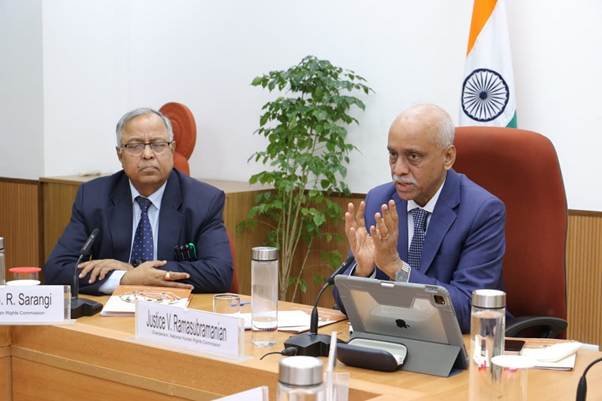
Justice Ramasubramanian noted that it took 30 years for the world to adopt a human rights approach to disability rights. Recalling the evolution of laws and policies related to seeking the welfare of disabled persons in the world, he said that in India, parallel to the international developments included the 1987 Mental Healthcare Act, the 1995 Persons with Disabilities Act, and the 2016 Rights of Persons with Disabilities Act.
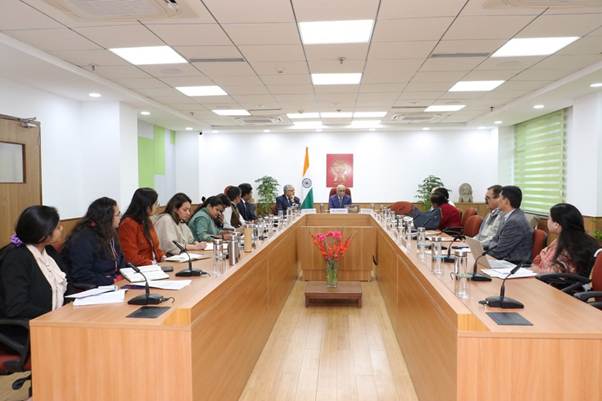
However, he said there may be a scope for improvement in disability-related laws, policies and their implementation. For this, he said that all the stakeholders needed to prioritise their suggestions for the improvement in disability-related laws, policies and their implementation requiring the intervention of the Parliament, NHRC and judiciary need to be segregated into three categories to evolve a clear action plan.
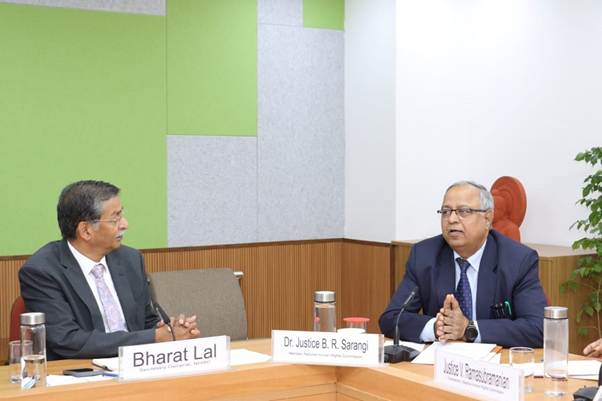
NHRC, India Member, Justice (Dr) Bidyut Ranjan Sarangi said that there is a need to strategise and find ways to improve the lives of persons with disabilities. Therefore, all the stakeholders including the Government need to come together and give them moral support to survive in a dignified manner. The issue of medical expenses needs to be taken into consideration and made available to the person.
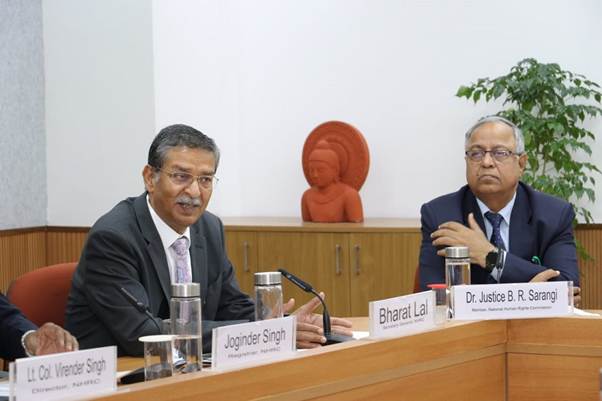
NHRC, India Secretary General, Shri Bharat Lal while setting the agenda for discussion, said that the Commission engages with many stakeholders including government officials, domain experts, researchers, academicians, and people working on the ground. He gave an overview of the three technical sessions- Defining and classifying progressive disabilities, Legal & policy framework for addressing disabilities and Promoting inclusive & equitable support services.
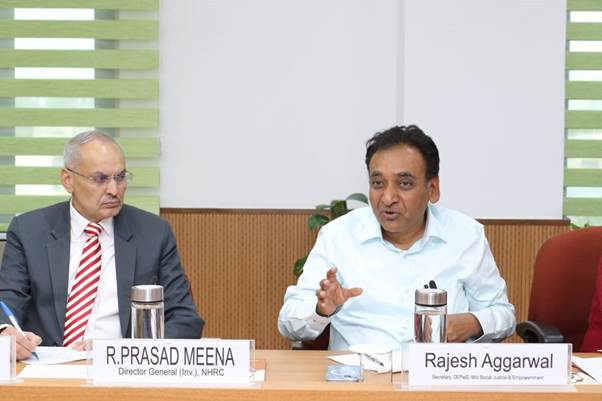
Shri Rajesh Aggarwal, Secretary, Dept. of Empowerment of Persons with Disabilities, Union Ministry of Social Justice & Empowerment said that the 2011 Census reports 2.2% of India's population as having disabilities. However, at times stigma leads to under-reporting, especially among the elderly, as disabilities in old age are often considered normal. While polio cases are decreasing due to institutional deliveries and improved care, disabilities from accidents and autism are rising, resulting in changes in the nature of disability orders. He said that regarding rights, there is a 4% reservation in government and PSU jobs and 5% in education for persons with disabilities (PwDs). He emphasized the need for better accessibility in buildings, transport, and digital platforms. India lags behind European countries in physical accessibility, though toilet facilities for PwDs have improved. Digital accessibility is relatively better.
He stressed that education accessibility, equal opportunity, and reasonable accommodation can help 95% of people, which should be society’s priority. If there is a chance that a disability will improve or progress, a temporary certificate is given to them despite having a 5% or 80% disability. But if the disability remains the same or worsens, a permanent certificate will be given. Presently, more than 70% of certificates in the country are permanent.
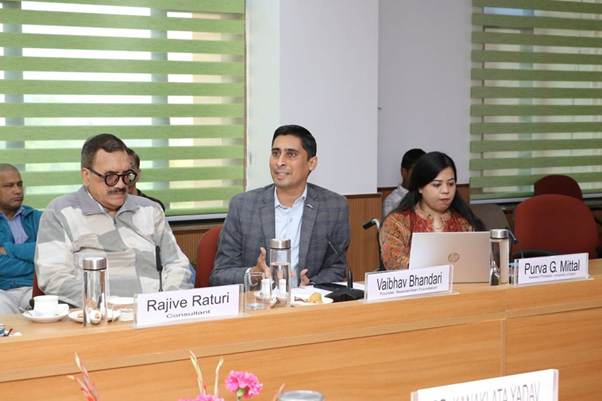
The participants included Dr Sunita Mondal, Additional Director General, Directorate General of Health Services, Ministry of Health and Family Welfare, Dr. Rupali Roy, Assistant Director General, Ministry of Health and Family Welfare, Shri Rajive Raturi, Consultant, Ms. Shivani Jadhav Representative, National Centre for Promotion of Employment for Disabled People (NCPEDP), Dr Satendra Singh, Director-Professor of Physiology, University College of Medical Sciences & GTB Hospital, Ms Purva G. Mittal, Asst. Prof, University of Delhi, Shri Akhil S. Paul, Director, Sense International (India), Dr Vaibhav Bhandari, Founder, Swavlamban Foundation, Shri Vikas Trivedi, Member Secretary Rehabilitation Council of India, New Delhi, NHRC DG(I), Shri R Prasad Meena, Registrar (Law), Shri Joginder Singh, Director, Lt Col. Virender Singh among others.
Some of the suggestions emanated from the discussions included:
1. Encourage collaborative efforts with the private sector to provide quality employment for PwDs;
2. Need to revisit the 40% mark for benchmark disabilities, as this holds back many beneficiaries from being able to access quality healthcare services and even a disability certificate;
3. Create adequate healthcare and rehabilitation provisions, particularly for those requiring high support needs, consequently, alleviating the burden of caregivers;
4. Necessity of establishing a clear and comprehensive definition of progressive disabilities and promoting the development and accessibility of assistive technologies;
5. Need for more inclusive and comprehensive health insurance regimes and schemes, along with increased attention to financial accessibility;
6. Need for prenatal and pro-natal diagnosis for early intervention;
7. Reduce the cost of medical expenses;
8. Enhance local production of medicines to make them more cost-effective;
9. Awareness and training for doctors, and community-based workers including ASHA workers needs to be increased for proper care of PwDs;
10. Ensure the availability of AI products to assist persons with disabilities;
11. Better healthcare, policies, treatments, screenings, financial aid, psychological support;
12. Create awareness against workplace discrimination;
The Commission will further deliberate upon the suggestions and more inputs from different stakeholders to finalize its recommendations ensuring the protection of rights of the persons with disabilities.
***
NSK
(Release ID: 2104230)
Visitor Counter : 1709